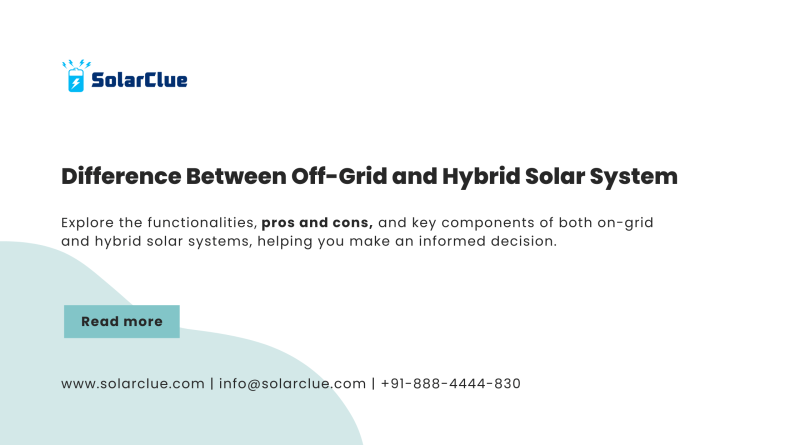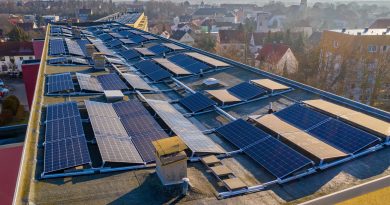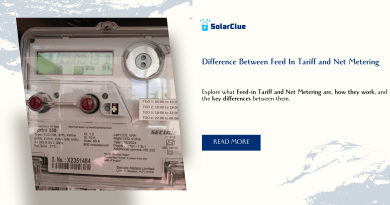Difference Between Off-Grid and Hybrid Solar System
Solar energy has become an increasingly popular choice for homeowners and businesses looking to reduce their carbon footprint and lower energy costs. Two of the most common types of solar systems are on-grid and hybrid solar systems. Understanding the differences between these systems is crucial for choosing the right one for your specific energy needs. This blog will explore the functionalities, pros and cons, and key components of both on-grid and hybrid solar systems, helping you make an informed decision.
Table of Contents
On-Grid Solar System
Definition and Functionality of an On-Grid System
An on-grid solar system is directly connected to the utility grid. It generates electricity from solar panels and supplies power to your home or business. Any excess electricity is fed back into the grid, often resulting in credits on your electricity bill through a process known as net metering. This type of system does not include battery storage, so it relies entirely on the grid for backup power.
Pros and Cons of an On-Grid System
Pros:
- Lower Initial Cost: Since there is no need for batteries, the initial investment is lower.
- Net Metering Benefits: You can earn credits for excess electricity sent back to the grid, reducing your overall electricity bill.
- Simplicity: Easier to install and maintain due to fewer components.
Cons:
- No Backup Power: During power outages, the system does not provide electricity as it relies on the grid.
- Dependence on the Grid: Your energy supply is dependent on the availability and reliability of the utility grid.
Considerations for Installation and Maintenance
When installing an on-grid system, it’s essential to consider the availability of net metering programs and the reliability of the local utility grid. Maintenance is relatively straightforward, focusing primarily on cleaning the solar panels and ensuring the inverter is functioning correctly.
Hybrid Solar System
Definition and Functionality of a Hybrid System
A hybrid solar system combines the features of both on-grid and off-grid systems. It generates electricity from solar panels, stores excess energy in batteries, and can also draw power from the grid when needed. This system provides the flexibility to use stored solar energy during power outages or at night, ensuring a continuous power supply.
Pros and Cons of a Hybrid System
Pros:
- Energy Independence: The ability to store energy in batteries reduces reliance on the grid.
- Backup Power: Provides power during grid outages, ensuring continuous electricity supply.
- Flexibility: Can switch between using solar power, stored energy, and grid electricity based on availability and need.
Cons:
- Higher Initial Cost: The inclusion of batteries increases the overall cost of the system.
- Complexity: Installation and maintenance are more complex due to the additional components.
Key Components of a Hybrid System
A hybrid system typically includes solar panels, an inverter, battery storage, and a connection to the utility grid. These components work together to manage energy generation, storage, and consumption effectively.
Comparison of On-Grid and Hybrid Systems
| Feature | On-Grid Solar System | Hybrid Solar System |
|---|---|---|
| Cost | Lower initial cost, no batteries required | Higher initial cost due to battery storage |
| Energy Storage | No storage; relies entirely on the grid | Includes batteries for energy storage |
| Backup Power | No backup power during outages | Provides backup power during grid outages |
| Dependence on Grid | Fully dependent on grid | Partial dependence; can operate independently |
| Suitability | Ideal for areas with reliable grid supply and net metering | Suitable for areas with frequent outages or unreliable grid |
| Maintenance | Simpler, with fewer components | More complex, requires maintenance of batteries |
Conclusion
Summary of Key Points
Choosing between an on-grid and a hybrid solar system depends on various factors, including your energy needs, budget, and the reliability of the local utility grid. On-grid systems are more affordable and simpler to maintain, but they do not provide backup power. Hybrid systems offer greater flexibility and energy independence but come with a higher initial cost and complexity.
Importance of Consulting with a Professional Before Making a Decision
Before deciding on the type of solar system to install, it’s crucial to consult with a professional. They can assess your specific energy requirements, budget, and location to recommend the best system for your needs.
Final Thoughts on the Future of Solar Energy
As technology continues to advance, solar energy systems are becoming more efficient and accessible. Whether you choose an on-grid or hybrid system, investing in solar energy is a step towards a more sustainable and cost-effective future.
If you’re trying to decide between an off-grid and a hybrid solar system, it’s essential to choose the option that best suits your energy needs and lifestyle. A hybrid solar system offers the perfect balance of independence and reliability, combining solar power with battery storage and grid connectivity. To learn more and get expert advice on which system is right for you, visit SolarClue. SolarClue provides top-notch solar solutions and installation services tailored to your specific requirements. Take control of your energy future—explore your options and make the smart choice with SolarClue today!



